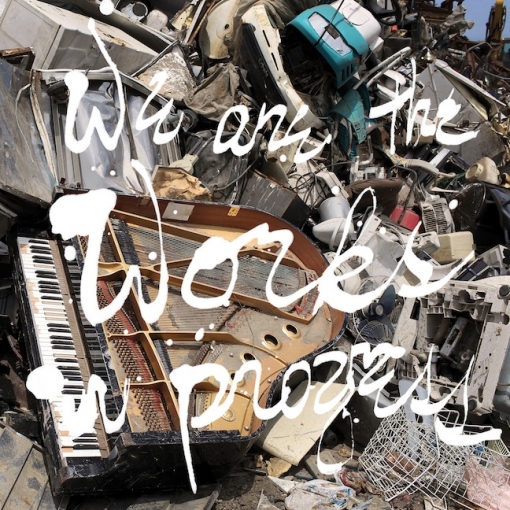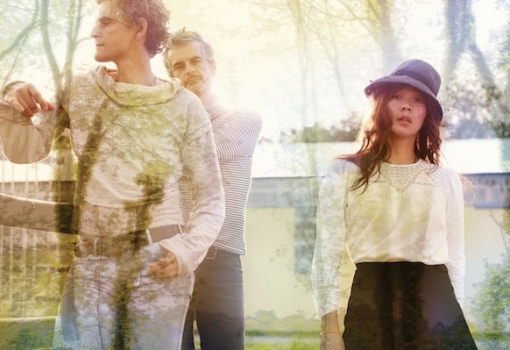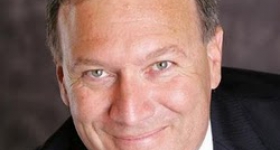Kazu Makino Photo by Drew Brown
Kazu Makino, the voice of veteran avant-garde rock band Blonde Redhead, was not what I expected an established indie star to be. When the interview began, she seemed more interested in talking about me (I apparently have a Scandanavian accent). Generous and humble, her answers were thoughtful and, at times, delightfully unexpected.
Below, she talks about We Are The Works In Progress, the 14-song Japan benefit album that she curated, named one of Flavorwire's "fantastic charity albums that are worth your time and money," as well as spooky Tokyo, making music, and being a work in progress herself.
Do you remember where you were, what your reaction was, when you heard about the earthquake and tsunami?
When something like that happens, it makes you want to go back in time or you wish you could wake up from it and not see that it really happened. It's one of those nightmarish physical shocks that I felt. I was in New York. I was in a very protected environment. It seemed so peaceful, I was in the woods... And then I ran to call my parents and I couldn't reach them.
How has Japan changed since this disaster?
Japanese people, in general, they really try to look away from the politics, but I think they've become completely aware of the mistakes of keeping themselves looking away from it, and having trust in the government. I think that's changing drastically...
I went back to Japan recently. And it made me quite sentimental because it's much darker now. Literally, it's darker. You go to the fanciest street in Tokyo and one street over it's pitch dark at 7:00 pm to save energy. It's quite romantic being in such an old country. It's quite spooky in a way. But that's not a bad thing. Some things -- say, people really love eating, they love seafood and fish, and I'm not sure how careful they are. I felt like they could be a lot more careful.
How's it spooky?
Because it's old: the building's old, the pavement's quite ancient. And if there's no light, not enough streetlights, you feel like you're going to bump into ghosts or something. And this happens behind the Comme des Garcons boutique or something like that. I like it because I'm from Kyoto, the oldest part of Japan. They keep it quite much darker than Tokyo or Osaka. And I'm always used to that, and I'm always in favor of that.
The proceeds from this album will go to the Japan Society and the Architecture for Humanity. Could you talk more about these organizations?
In the beginning I spent so much time researching the specific organizations in Japan. We wanted to send money, put the money in a specific way. Put it towards people who study sustainable energy, people who can install solar panels in affected areas, the people who are making sure the children who lost their parents in the affected areas are finishing their school, the people who are building sustainable construction for all the people who lost their homes. I was really excited about being as specific as possible. And then in the end, it turned out that we couldn't give money to organizations that didn't have a branch in America.
Because of 501(c)3 tax benefits?
Exactly! And it was so upsetting to me. But the two organizations that you see, they have branches in America, and they are tax-exempt. And they have agreed to listen to our wishes and desires on how the money should be spent, and they will pass it on to the organizations there, they're in a position to put it towards the organizations that I really wanted to put the money towards. So they'll be the middle-man.
On the We Are The Works In Progress website, you link to Ryuichi Sakamoto's Kizuna World. Are you involved with his Artist's Power Organization?
I'd like to. He was an advisor first, in me completing this because I didn't know what I was doing, and I was a little bit insecure about my lack of knowledge in the field. And he really guided me through. He and his girlfriend, who manages him. And he's a truly musical person, and to see a person like that also being able to be active socially, was quite astonishing to me that you could do both.
Is that what you hope to do going forward?
No, I'm not made for that. I know I don't have that in my nature. But if I could do even just this one time, something decent, then I'd be so pleased. But I think I'm more a person who is able to support him or follow him, I'm not anyone who can lead or guide other people like the way he does.

Can you describe the music in We Are The Works In Progress?
I didn't want the really finished material. I wanted to have works that had so much energy because they were in progress, in the making. The very material that makes artists want to complete, want to do something more, the material that inspires them the most to do what they do.
It's somewhat freakishly coherent, I find, but it was not deliberate. That was something I did not anticipate at all. I was listening to it with my friend one night, and he said, "Doesn't this sound like we literally, one artist is passing the baton to the other?" And yeah, it's true, but it just happened like that.
You gathered a very diverse group of artists. What did putting the album together involve, exactly?
I literally called them and dropped the email. Some of them I'd never met before, so I wrote their websites and their fanclubs, and I got replies. And it's pretty amazing that they all answered me.
What was the toughest part about curating this album?
Waiting. Because I'm -- we're quite famous for being late, and on top of it we have quite an attitude about being late too. And it was very humbling that I had to suddenly be in a position to rush, to beg people to submit the music. It was painful having to remind them -- "Okay, do you have it now? Could you send it to me soon?" That was really dreadful. Now I'm going to have to think about it twice when something doesn't get done in time.
What do you hope to accomplish with We Are The Works In Progress?
I would like to be some part of support system. I would like to give the Japanese public the courage to do what they feel is right. I believe our culture is so closely woven with nature, I think we have the culture that grows out of nature, and to be able to respect it, all cycles of life. So I want our future to come from that also. I certainly believe that nuclear plants and nuclear power doesn't have anything to do with the instincts that we Japanese people have in our culture. I just want people to have the courage to walk away from it somehow.
Even if our remaining time is quite limited, and maybe this is too late, and we're all bound to go to this terrible ending. I don't know. But until then, I would like people to choose the right path, the positive, natural path.

Photo via blonde-redhead.com
You said once that, when you were starting out, you hated the attention you were getting. When and how did this change?
I still hate the attention. I've come to terms with it. But yeah, I really used to think "I wish nobody would show up"?
So you primarily made music for yourself and your band members?
I didn't think about that either, but yes, I suppose so. [Pause] No! I think what I wanted was, I always thought that we weren't good enough to be exposed like that. At the same time, we started writing music in public. Some people stay in their bedroom until they come up with a masterpiece. And I think we were already playing shows while writing our first songs. That's just the way it happened. And it still doesn't feel like, okay we're good enough to be doing this publicly. So that's the conflict I suppose I'm having.
So the name of this album We are the Works in Progress...
Justifying my act, I suppose! At the same time, I don't forgive myself, but other people, those are their best moments. Those are the things you can appreciate most, in people that are really creating something. Because there's energy, there's emotion, there's potential, there's so much unsaid things in Works in Progress, and you can really appreciate that.
Is there something we haven't gotten to, anything else that you'd like others to know?
Anytime I do interviews I'm realizing how inadequate I am in expressing myself. I just don't know how to talk, sorry. I suppose I do think quite in abstract, it's not meant to be concrete. And part of my mind is still drifting away. And I keep telling myself, "Kazu, keep your focus. Focus!" It's not that I'm not interested, it's just that I have such a fine practice of drifting my mind, that I can't not do it, no matter what situation I'm in.
Where does your mind drift to?
It just travels to the universe. [Laughs] I do hope those things are even more profound when you die, you'll be able to run through the universe and see things from a completely different perspective all around. It keeps changing. I wonder if you'll be able to reincarnate right away, or stick to death.
You believe in reincarnation?
You must, otherwise the world of dead must be completely overpopulated, no?
So you believe in reincarnation for economic, mathematical reasons.
Yeah. I believe everything needs to be recycled, even the spirit.
We Are The Works In Progress, a 14-song benefit album to support Japan in its efforts to heal post-tsunami, and featuring tracks from Four Tet, Terry Riley, Nosuj Thing, Interpol, and of course Blonde Redhead, was released today, February 7, and can be ordered via Saki and Amazon.










Comments